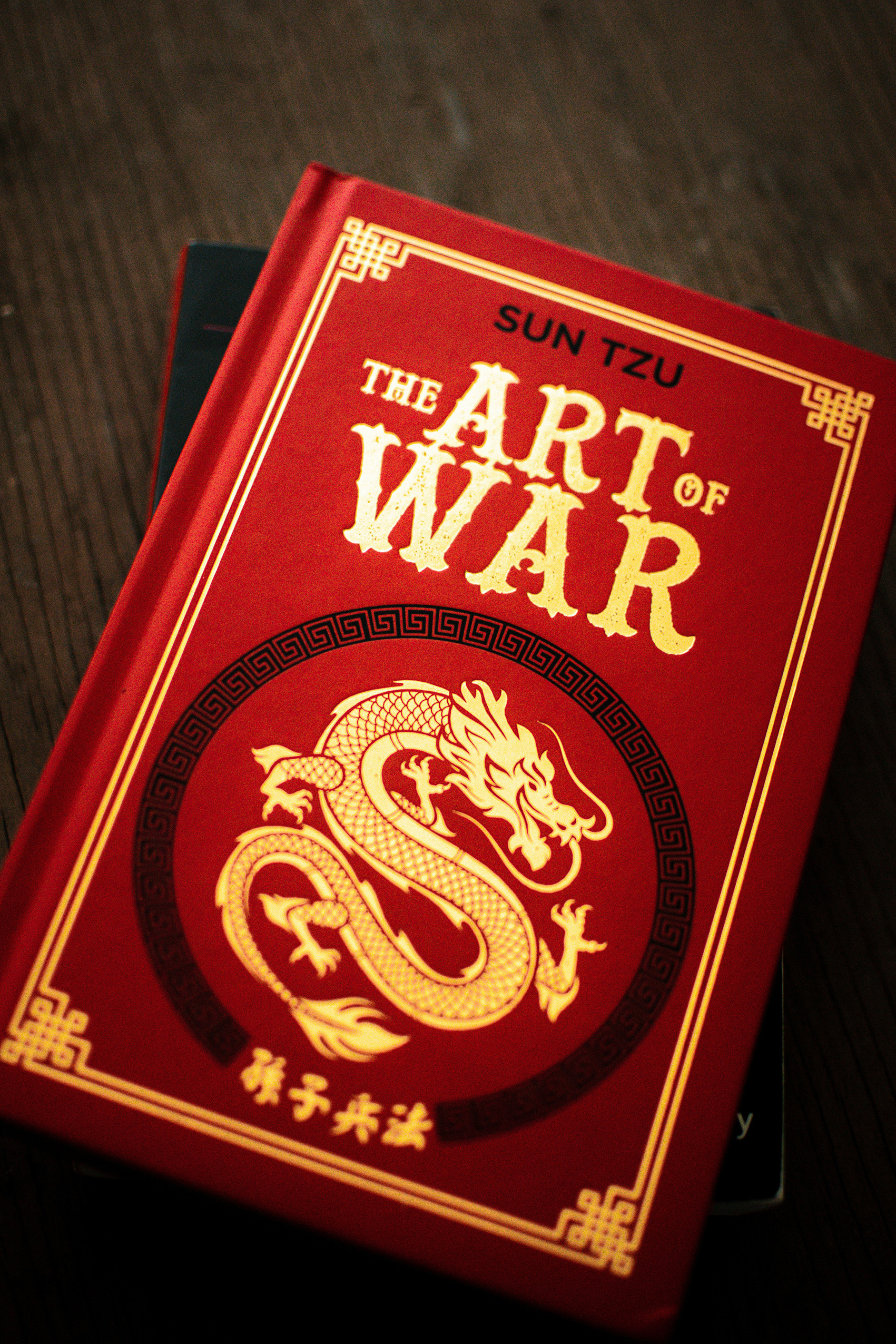4/8/2025

The Art of War is not just a 2500-year-old military treaty. It's a strategy manual that continues to influence leaders, entrepreneurs, coaches, and even chess players. Written by Sun Tzu (, Chinese general and master tactician, this book teaches that true victory does not always come through combat, but through intelligence, foresight, and self-control.
Today, The Art of War (in Chinese, p.m.) goes far beyond the military. It inspires business leaders as well as political strategists. Why? Because its principles are simple, universal, and awfully effective.
In this article, we explore What the Art of War teaches us about strategy, decision-making, and conflict management — in all areas of life. Whether you are a manager, a student or simply curious, you will understand why this text remains an essential classic.
Sun Tzu (or Sunzi) is an enigmatic figure from ancient China. It is estimated that he lived in 6th century BC, during the Warring States period (Ancient Times). A general and philosopher, he is best known for his major work: The Art of War, a collection of thirteen chapters devoted to military strategy.
Unlike other warlords of his time, Sun Tzu advocated Victory without direct confrontation. For him, the best fight is the one you avoid. He said that a good strategist wins. before the battle even started, by analyzing the weaknesses of the enemy, by controlling the terrain, and by influencing the course of events without unnecessary violence.
“The supreme art of war consists in subduing the enemy without fighting.” - Sun Tzu
Few biographical details are confirmed, and some researchers even doubt its real existence. But its influence is very real. His treaty has spanned the centuries, integrated the military traditions of Asia, and then established itself in the West in the 20th century, particularly in military, political and economic circles.
The Art of War is composed of 13 chapters, each dedicated to one aspect of the strategy. Despite its brevity, the text is dense and full of principles applicable far beyond the battlefield. Here are the main ideas to remember:
Sun Tzu places intelligence and cunning above brute force. The aim is not to destroy the enemy, but to neutralize his will to fight. This can be done through deterrence, diplomacy, or manipulation.
“Know your enemy and know yourself, you will never be defeated.”
This fundamental principle is based on the strategic knowledge : understand your own strengths and weaknesses, but also those of the opponent. Ignorance leads to disaster.
The right strategist adjusts to the situation as water follows the shape of a vase. It doesn't stick to a rigid plan. It reads the environment, captures opportunities, and acts at the right time.
Sun Tzu values unpredictability. Deceive, pretend, hide your intentions : as many weapons more powerful than a frontal assault. An enemy that doesn't understand your movements can't react effectively.
War, whether military, economic, or psychological, is costly. Sun Tzu recommends preserve its resources, to avoid protracted conflicts, and to act with surgical efficiency.
Each principle of The Art of War can be translated into concrete situations: crisis management, negotiation, leadership or even sports competitions. It's not a war manual, it's A guide to getting the edge with finesse.
More than two millennia after it was written, The Art of War is still being studied, cited and applied. And for good reason: its principles do not age, because they treat Of human strategy, not just war. Here is why it continues to make an impression.
In the business world, competition is omnipresent. Businesses compete to conquer markets, attract talent, or innovate faster than others. The Art of War is often used for:
Many leaders are inspired by it to Define effective action plans, avoid unnecessary clashes and better distribute their resources.
Modern leaders don't lead troops, they lead teams. They have to motivate, coordinate, negotiate. Sun Tzu teaches that Command is not based on raw authority, but about vision, self-control, and emotional intelligence. A good manager, like a good general, should:
The lessons of The Art of War also relate to psychology: discipline, clarity of mind, management of internal conflicts. It is a powerful tool for:
From political advisers to negotiators, many use Sun Tzu's logic to anticipate opposing movements, build alliances, or influence discreetly. His approach to Indirect warfare and the balance of forces remains a pillar of modern diplomacy.

The influence of The Art of War goes far beyond the military or academic framework: its principles intrude into popular culture, affecting various media and fields.
In movies and in series, strategies inspired by Sun Tzu are often found in storylines. For example, movies like Lord of the Rings or Game of Thrones exploit the importance of strategy, cunning and knowledge of the enemy, fundamental concepts of the treaty. Even in thrillers or spy movies, psychological warfare and invisible maneuvers recall the teachings of the Chinese strategist.
In video games, including real-time strategy games like StarCraft or Civilization, players must master adaptation, careful preparation, and surprise — all tactics that come directly or indirectly from Sun Tzu's precepts. These games echo his philosophy by encouraging people to anticipate opposing movements and to manage resources intelligently.
In addition, the book also inspires the speeches of leaders and management books. Many business leaders or leadership coaches cite Sun Tzu to illustrate business strategies or conflict management methods. Its vision goes beyond simple military confrontation to become a true school of strategy in professional and personal life.
So, The Art of War stands out as a timeless reference, subtly integrated into our stories, entertainment, and professional practices, proving that his wisdom remains universal and accessible to all.
“All wars are based on deception.” (
This iconic quote recalls the importance of cunning in strategy. Sun Tzu teaches that success comes not only from brute force, but from the ability to outsmart the expectations of the enemy. In a modern context, this applies to business negotiations as well as to communication tactics.
“Know your enemy and know yourself, and you will win a hundred battles without ever being in danger.”
Knowledge is key here: understanding your strengths and weaknesses as well as those of your opponents makes it possible to anticipate blows and adapt your strategy. This maxim is particularly used in management, where competitive analysis and introspection are essential tools.
“Water takes the shape of the container that contains it.” ()
Flexibility is a major virtue for Sun Tzu. Adapting to the environment, to the circumstances, is the key to avoid defeat. In the world of business or personal development, this idea encourages staying agile in the face of change.
“The supreme excellence consists in breaking the enemy's resistance without fighting.” (struggled with the enemy's resistance without fighting.)
Another fundamental lesson: the noblest victory is that achieved without bloodshed, through strategy and negotiation. This principle applies widely in modern conflicts where avoiding direct confrontation is often the best tactic.
The Art of War is not just an ancient military manual; it is a genuine guide to strategy, psychology and philosophy applicable in a variety of fields. From rigorous preparation to self-control, to constant adaptation to the environment, Sun Tzu offers us valuable lessons that transcend time.
To reread this book with a contemporary perspective is to discover how its precepts can enrich our way of thinking about management, negotiation, or even our personal development.
So, ready to apply Sun Tzu's strategies in your life? Feel free to share this article, leave a comment on your favorite passages, or explore our other articles to deepen your understanding of The art of war on a daily basis.